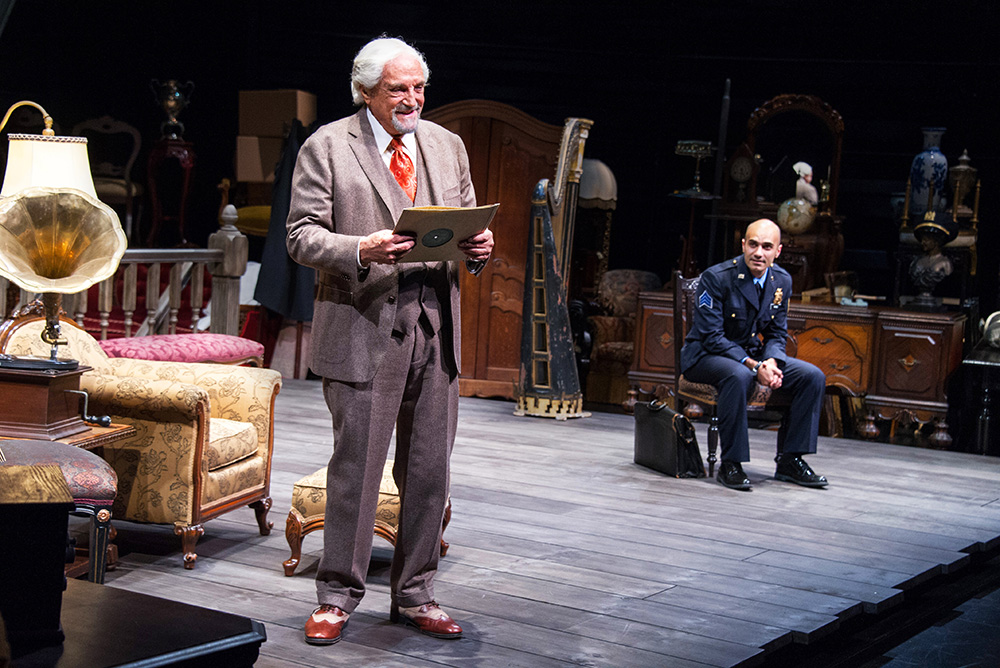
Hal Linden, as used-furniture dealer Gregory Solomon, finds memories in the Franz family attic, with Maboud Ebrahimzadeh as Victor Franz sitting at right. / Photo above and on the front by Colin Hovde.
I’M SITTING HERE hunched over in the “breakfast room” (where I rarely eat breakfast) hiding from the painters, who are crawling around all three floors of the house following a logic I can’t discern.
It’s been eight days so far—and I don’t even have a big house.
More significant, this week’s worth of days follows the seven days I spent, eight hours a day, actively engaged with two helpers, sorting through 30 years’ worth of stuff. (How did I assemble all that crap? I can’t blame it all on Christmas gifts.) The three of us got into a good rhythm: trash, recycle, donate, store, trash, recycle, donate, store. I’m hoping that my impression is correct, that there was a whole lot less in the last category (sent to my new storage facility, as I join 9.5 percent of American households that rent such space) than in all the other categories.
Otherwise I might well find myself in the same position as the Franz brothers, prime movers in Arthur Miller’s The Price, playing five more performances through Sunday, November 19, 2017, at Arena Stage in DC.
The play is about choices each brother made, the ones they felt they had to make, the ones they

Maboud Ebrahimzadeh, above, opened as Victor Franz in The Price. The role is now played by Ricardo Frederick Evans, through Sunday, November 19, 2017 at Arena Stage at the Mead Center for American Theater. / Photo by Colin Hovde.
tricked themselves into believing were the only correct ones, the choices their (as we learn, selfish) father made that had such impact on their lives. The brothers gesture toward the father’s empty easy chair at points throughout the play, able to cast blame only because it is just that, empty.
The Franz family was well-to-do until the Wall Street crash of 1929. That’s when life started becoming smaller and smaller, when all the fancy furniture from their former life gradually wound up in an attic. Now the building is going to be torn down, and the furniture has to be dealt with.
I suspect I wasn’t the only audience member who recognized the guilt, even the shame when learning that the Franz boys had left the family furnishings untouched in the 16 years since dear old Dad died. That’s a long time, but what you don’t see you don’t have to deal with, emotionally or otherwise.
Kinda like my basement. I didn’t have an appraiser, played craftily and winningly by the 86-year-old Hal Linden (yes, of Barney Miller TV fame), to look around and offer to buy everything. But I did have Magie and Elena, the two women who sat with me day after day while we pawed through my possessions.
I swear I was sensitive to the usual Arthur Miller father-son theme, the gradual recognition that what happened didn’t have to happen, yet maybe it did. But, trapped as I was in my own possession obsession, I also gulped with recognition at some of the observations made by Linden’s Gregory Solomon, the 89-year-old appraiser and used-furniture dealer looking to make one last score.
Half imp, half geezer, Linden’s Solomon tells the “good” son that there is almost too much stuff for the old man to take on, while at the same time claiming it’s not really worth all that much. At one point he asks the son to help him measure a chest of drawers. “Forty inches,” the son says. “So?”
Solomon crows: “My boy, the bedroom doors in a modern apartment house are 30, 32 inches maximum. So you can’t get this in.” Who will he sell that chest to? They won’t even be able to get it into the house. My 19th-century front door could accommodate it, but the fancy new “atrium” door leading to the rear patio? Not a chance.
Last week I sent, among other things, a 19th-century Chinese wardrobe to be donated (to whom? no idea!), having learned the hard way that people don’t want used furniture, not even antiques, the more expensive name for used furniture. My friend Mary told me that neither of her kids was interested in feathering their new nests with any of their grandparents’ furnishings (waiting, I might add, in a storage facility for the past 20-odd years). “They just want to go to Ikea!” she said with a mixture of exasperation, resignation and understanding.
Arthur Miller’s Solomon has an idea why young people, especially Americans, won’t want the trappings of this lost affluent life. It’s not so much the look or the size of the pieces. It’s that they look at it, he says, and they see a finished life, the end. No more reason to go shopping for new things. New things hold promise; these furnishings hold little but dashed dreams.
It’s the American answer to everything, Arthur Miller had his curmudgeonly old character pronounce back in 1968, when the play made its debut: Go shopping!
Which, come to think of it, is how I wound up with a basement full of stuff. Whereas all my real valuables are what I carry around in my heart and in my head: my family, my friends and my memories.
—Nancy McKeon

Yep. Shopping. Retail therapy. That’s what I used to do too. Now I feel burdened by all the accumulated STUFF and just want to clear it all out. I think back to my college days when everything I owned barely amounted to one car load. Not a bad way to live. Today I’m like Edina Monsoon. “Surfaces. I want surfaces.” Of course, you would never know that if you could see my living room.